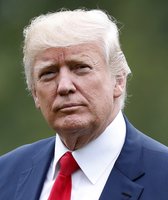U.S. President Donald Trump speaks at a campaign rally at Atlantic Aviation in Moon Township, Pa., Saturday, March 10, 2018. (AP Photo/Carolyn Kaster)
風蕭蕭_Frank
以文會友Trump Urges Death Penalty for Drug Dealers: 'China Has No Drug Problem'
Trump Urges Death Penalty for Drug Dealers: 'China Has No Drug Problem'
Former President Donald Trump says the U.S. should model its response to the illegal narcotics trade on China, where he said accused drug dealers are executed after swift trials.
Trump made the remarks in a speech he delivered in Las Vegas, Nevada, Friday during a rally for his endorsed candidates in the state's gubernatorial and Senate races. The speech was marked by two recurring themes for Trump: a demand for law and order, as well as an admiration for heavy-handed governance.
Addressing what he's characterized as an alarming wave of violent crime, Trump prefaced his praise for China by saying he would either "get a standing ovation" or "people are going to walk out of the room."
"If you look at countries all throughout the world ... the only ones that don't have a drug problem are those that institute the death penalty for drug dealers. They're the only ones, you understand that? China has no drug problem," Trump said to applause.
"Why would you have such a dumb question is that no, no, no, we don't have a drug problem. Why would we have a drug problem? There is no problem. Drug dealers get the death penalty. The trial goes very quickly. So instead of coming into China, they go someplace else. We've had big drug problems over the centuries, but we don't have a drug problem at all. Now, they don't deal in China," the former president said.
Ex-President Donald Trump again called for the U.S. to execute people for drug crimes. Above, Trump pauses while speaking at a rally endorsing Republican candidates on July 8, 2022, in Las Vegas, Nevada.
However, there is evidence that China does indeed have a drug problem. The number of drug users in China rose to 2.51 million by the end of 2016, a 6.8 percent year-over-year jump, according to a National Narcotics Control Commission, reported on by Xinhua.
Ruled by the authoritarian Communist Party, Chinese authorities have openly sentenced suspected drug dealers to death. In 2009, China caused diplomatic uproar by executing Akmal Shaikh, a mentally ill British citizen, for smuggling more than 8 pounds of heroin into the country.
A United Nations human rights agency concluded in a 2015 report that using the death penalty for drug-related offenses doesn't meet international standards. The report notes that authorities can use drug laws to single out marginalized communities.
Yet, at least 131 people were executed for drug crimes in 2021, a more than threefold increase from the previous year, according to a report from advocacy group Harm Reduction International. The report states that 35 countries use the death penalty for drug offenses, particularly authoritarian countries including Iran, Vietnam, North Korea and China.
Amnesty International noted in its 2021 report on executions that China and Vietnam keep data on the death penalty secret. The Congressional-Executive Commission on China has also noted that China lacks an independent judiciary.
Previously, Trump has praised China's strict approach to drug crimes, once in a 2020 meeting with U.S. governors. A year earlier, he said he was "excited" about China sentencing fentanyl dealers to death.
Newsweek has reached out to Trump for comment.ingapore impose the death penalty on drug dealers.
Donald Trump says China, Singapore have death penalty for drug dealers
https://www.politifact.com/factchecks/2018/mar/14/donald-trump/donald-trump-says-china-singapore-have-death-penal/
President Donald Trump floated the idea of imposing the death penalty on drug dealers in the United States during his Pennsylvania rally, saying China and Singapore do it and they don’t have a drug problem.
"The only way to solve the drug problem is through toughness," Trump said March 10 while stumping for Republican congressional candidate Rick Saccone. "When you catch a drug dealer … you got to put him away for a long time."
Trump shared conversations he had with leaders of China and Singapore.
"When I was in China and other places, by the way, I said, Mr. President, do you have a drug problem? ‘No, no, no, we do not.’ I said, Huh. Big country, 1.4 billion people, right. Not much of a drug problem. I said what do you attribute that to? ‘Well, the death penalty.’"
On Singapore, "I said, Mr. President, what happens with your drugs? ‘No. We don't have a problem, President.’ I said, really why? ‘We have a zero tolerance.’ And he is not playing games … So what do you mean no problem? ‘We have a zero tolerance policy.’ What does that mean? ‘That means if we catch a drug dealer, death penalty.’ "
PolitiFact decided to fact-check whether China and Singapore have the death penalty for drug dealers as Trump claimed. (We will set aside for now whether these countries have "no" drug problems as a result, as Trump claimed the leaders said.)
We found those countries do have the death penalty for individuals who traffic, smuggle or transport certain drugs. The White House did not comment on the record, but in the context of Trump’s speech, it appears these are the individuals he was referring to when speaking about "drug dealers" — not just individuals who may sell drugs on the streets.
Nonetheless, China and Singapore have also been called out as human rights abusers for these practices, and drug policy and law experts expressed skepticism about the death penalty being a deterrent for drug trafficking in the United States.
Chinese law says that individuals who smuggle, traffic, transport or manufacture drugs and meet certain conditions are to be punished with 15 years of fixed-term imprisonment, life imprisonment or death sentence, and confiscation of their properties.
The law mentions certain amounts of opium, heroin, methylaniline and "other narcotic drugs of large quantities."
Human rights groups and experts say data on death sentences and executions in China is unreliable and unknown. That information is kept as a state secret. Amnesty International estimates thousands of people are executed and sentenced to death each year.
Given data limitations, it's difficult to assess the efficacy of its policy against drug offenders.
Singapore’s Misuse of Drugs Act calls for the death penalty for individuals convicted of trafficking specified amounts of opium, cocaine, cannabis, and other substances. The law said the word "traffic" means to sell, give, administer, transport, send, deliver or distribute.
Individuals possessing certain amounts of specified drugs are also presumed to have it for the purpose of trafficking, unless proven otherwise. Recent law revisions give courts discretion not to impose the death penalty in certain circumstances.
A March 2010 study on executions, deterrence and homicide in Hong Kong and Singapore said there are "no decent indicators" available regarding drug use over time in Singapore, and if the data exists, "they are a government secret."
Singapore’s minister for foreign affairs, Vivian Balakrishnan, at a September 2016 United Nations meeting said his country regarded drug trafficking "as a most serious crime," and that the death penalty kept major drug syndicates away from Singapore.
Singapore had eight executions for drugs from 2015 to 2017, according to a March 2018 report from Harm Reduction International.
Drug policy and law experts said attempts at similar laws in the United States would face constitutional obstacles.
They pointed to a high bar for the death penalty established in the 2008 U.S. Supreme Court case Kennedy vs. Louisiana, which addressed whether states violate the Eighth Amendment's ban on cruel and unusual punishment by imposing the death sentence for the crime of child rape. The court’s opinion said "the death penalty should not be expanded to instances where the victim’s life was not taken."
However, the court said its concern was limited to crimes against individual persons and did not address offenses against the State, such as treason, espionage, terrorism, and drug kingpin activity. Congress in 1994 enacted a law allowing the imposition of the death penalty for drug kingpins even if no death occurred.
"If the death penalty is unconstitutional to impose against a child rapist, it is hard to imagine a court upholding its imposition against a person for selling drugs," said Alex Kreit, a law professor and co-director of the Center for Criminal Law and Policy at Thomas Jefferson School of Law.
Experts also questioned how effective the death penalty would be as a deterrent for drug offenders.
"The likelihood of getting caught, prosecuted, convicted, and sentenced to death — especially at the federal level with only three executions since 1964 — is tiny," said Matthew Robinson, a professor of criminal justice at Appalachian State University.
Trump said China and Singapore impose the death penalty on drug dealers.
Chinese law says that individuals who smuggle, traffic, transport or manufacture drugs and meet certain conditions can receive a death sentence. Singapore’s Misuse of Drugs Act also calls for the death penalty for individuals convicted of trafficking specified amounts of opium, cocaine, cannabis, and other substances.
We rate Trump’s claim True.
m







